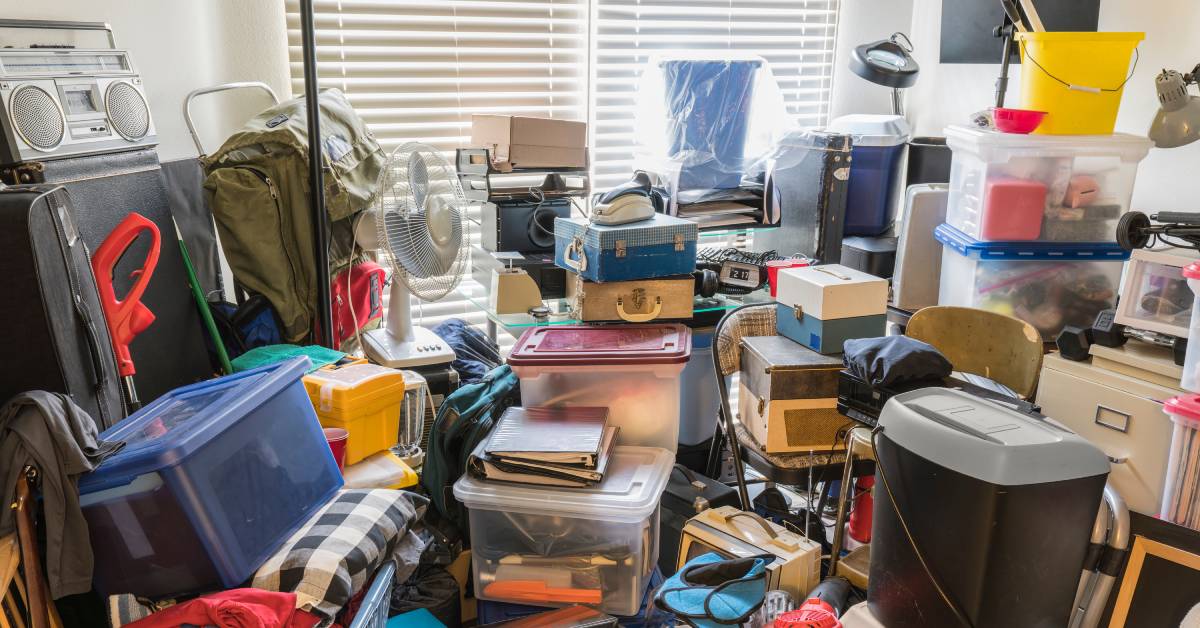12 Signs Your Loved One May Have a Hoarding Problem

Hoarding disorders are more common than most people think. You need to recognize it early if your loved one shows troubling behaviors. This guide will help you identify the signs your loved one may have a hoarding problem and provide practical steps to support them.
Understanding Hoarding Disorder
People with hoarding disorder collect items excessively, even when the items have no practical use. They often struggle to discard items, feeling immense distress at the thought of parting with them. That’s because hoarding is not just about clutter; it’s a mental health issue.
Understanding the psychological aspect is crucial in recognizing the signs your loved one has a hoarding problem. Take a look at the biggest indicators below.
1. Living Spaces Become Unmanageable
One of the first signs of hoarding is the state of living spaces. Rooms that once had clear purposes, such as a bedroom or living room, become filled with items.
Walking paths narrow, furniture becomes unusable, and in severe cases, rooms can become entirely inaccessible. If your loved one’s home has become unmanageable, this could be a red flag they’re hoarding.
2. Emotional Attachment to Possessions
People with hoarding disorders often form emotional attachments to their possessions. They may believe the items hold sentimental value, thinking each piece is irreplaceable. This emotional connection makes it difficult for them to part with anything, leading to accumulation over time.
3. Procrastination and Indecision
Hoarders often face significant difficulty making decisions. They might procrastinate, delay organization projects, or feel overwhelmed by the thought of sorting through their belongings.
This indecision results in piles of items, as they’re left unable to decide what to keep and what to discard. Pay attention if your loved one consistently puts off clearing clutter, as that could be a sign they may have a hoarding problem.
4. Social Isolation

Hoarding can lead to social isolation. The embarrassment over the state of their home can cause individuals to withdraw from social activities. They might avoid having visitors, fearing judgment or criticism. If your loved one has become more reclusive and reluctant to invite friends or family over, it could be due to hoarding.
5. Difficulty Discarding Items
Another sign of hoarding is the difficulty of discarding items. Your loved one may feel intense anxiety at the thought of throwing things away, regardless of the item’s actual value. This inability to discard is a core feature of hoarding disorder.
6. Distrust With Anyone Touching Their Possessions
Hoarding disorder can also lead to a strong distrust of anyone handling or moving possessions. This stems from the intense emotional attachment an individual has to their belongings and the fear of losing them.
Hoarders may become agitated, defensive, or confrontational if someone attempts to touch or remove items from their living space.
7. Clutter Blindness
Hoarding disorder leads to a phenomenon known as clutter blindness. Individuals with hoarding tendencies might not see the clutter in their homes the same way others do.
They may have difficulty recognizing it as a problem, leading to denial or avoidance of addressing the issue. Clutter blindness can cause friction and misunderstandings between loved ones.
8. Increased Anxiety and Stress

For individuals with hoarding disorder, the accumulation of items often leads to increased anxiety and stress. The clutter itself can be a source of distress, and the inability to control it exacerbates the problem. Pay attention to whether your loved one seems more anxious or stressed in relation to their living situation.
9. Financial Difficulties
Hoarding can lead to financial difficulties due to excessive spending on items. Your loved one might buy items impulsively, even when they don’t need them. This behavior can strain finances, leading to unpaid bills and debt.
10. Owning Multiple Storage Units
Another sign of hoarding is the need for additional storage space. Hoarders might rent or purchase multiple storage units to accommodate their excessive belongings. This behavior can be a red flag if the units become full of unnecessary and unused items.
11. Putting Off Repairs and Maintenance
Individuals with hoarding disorder may also put off necessary repairs and maintenance. This reluctance to address issues such as leaks, electrical problems, or structural damage can further worsen their living conditions and pose safety risks.
12. Trouble Finding Things
Despite excessive accumulation, hoarders often struggle to find specific items, leading to frustration and stress. This issue can also cause them to buy duplicate items, which further adds to their clutter and financial strain.
Health and Safety Risks
Hoarding can pose significant health and safety risks. Accumulated items can create fire hazards, exit obstructions, and unsanitary conditions. Pests and mold can also become issues in a cluttered environment. Address the hoarding behavior immediately if the living conditions have become hazardous.
Recognizing the Need for Help
Hoarding is a complex issue that often requires professional intervention. Recognizing that your loved one needs help is the first step.
Affinity Bio Solutions provides hoarding clean up services and assists in creating safer living environments.
Supporting someone with a hoarding disorder involves patience and understanding. Approach the subject with empathy, offering help without judgment. Suggesting small steps and celebrating progress can help them feel more in control of their situation.
Professional Help for Hoarding
Encourage the individual to seek therapy. Professional help from therapists or counselors can be beneficial in managing hoarding disorder. Offer to accompany your loved one to appointments or help them find a therapist.
Therapy can help individuals understand the root causes of their hoarding behavior, such as past traumas or emotional attachments to possessions. Therapists can teach your loved one to develop healthier coping mechanisms and decision-making skills.
Building a Support Network
A support network is vital for anyone dealing with hoarding. Family, friends, and support groups can provide encouragement and accountability. Knowing they’re not alone in their struggles can be incredibly comforting for someone with a hoarding disorder.
Recognizing the signs of hoarding in a loved one helps you address the issue. Understanding the symptoms and supporting them empathetically means you can improve your loved one’s quality of life. Affinity Bio Solutions can give you the support you need in cleaning up.
